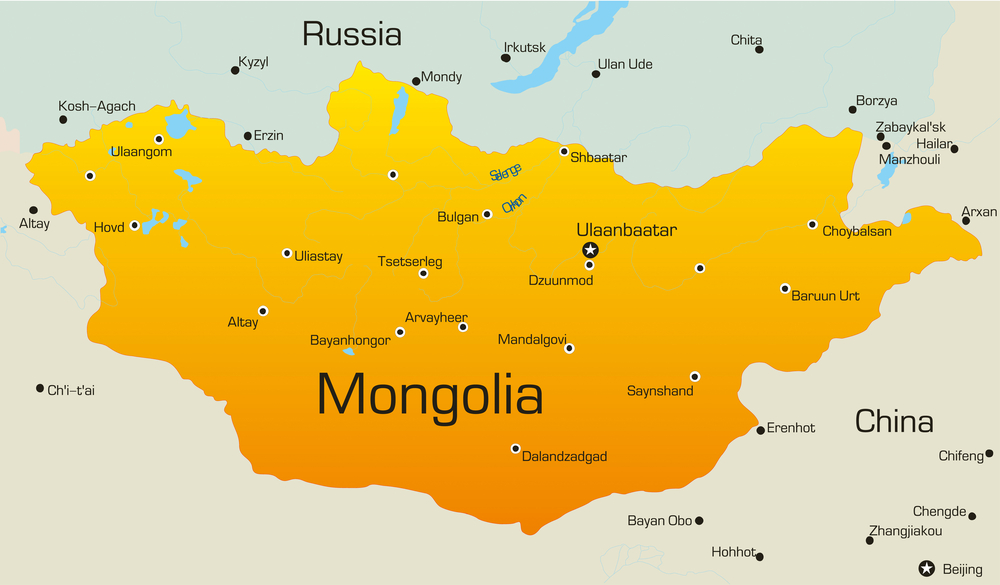Meetings took place last Friday between Alexei Tsydenov, the Governor of the Russian Republic of Buryatia, Buyaagiiin Tulga, a Mongolian Minister and the Chairman of the National Committee for the Revival of Border Points.
The meetings focused on improving cross-border connectivity as Mongolia is shortly to engage in a Free Trade Agreement with the Eurasian Economic Union (EAEU). Both Russia and Kazakhstan are members of the EAEU, both share borders with Mongolia. The Buryatia Republic borders Mongolia to the south and comprises the region around Lake Baikal. Its capital city is Ulan-Ude. It is connected to the Mongolian capital, Ulaan Baatar, as well as to Beijing by the Trans-Mongolia railway.
With improvements having been made to the border crossing Kyakhta-Altan-Bulag motorway, the two sides have decided that the Aynek Gol-Baga Ilenkh border crossing will be temporarily opened with a view to establishing a permanent crossing. Tsydemov said that “This requires additional study with the Russian authorised bodies, since even in a temporary regime, all procedures must be implemented in accordance with our legislation. We will study this issue further. Both our countries are interested in economic development and increasing trade turnover. Therefore, we have worked and will continue to work so that our people travel, so that industry and trade develop, and interaction moves forward.”
Mongolia-EAEU Free Trade Developments
Another result of the discussions was the abolition of duties on 375 types of agricultural products from Mongolia. The temporary agreement on duty-free trade between the EAEU and Mongolia covers three groups of goods. The position of meat and meat products will allow Mongolian producers to significantly increase the export of beef, lamb, horse meat and other types of meat to the Russian market. More shoes, bags, gloves, belts and other goods will be made from Mongolian leather for sale in Russia. Mongolian entrepreneurs will also be able to increase industrial production of wool and cashmere products.
The Mongolia-EAEU free trade agreement will make it possible to diversify Mongolian exports and significantly increase their volumes. As at early 2024, Mongolia’s share in bilateral trade turnover with Russia is just over 5%. According to the Russian Trade Mission, Mongolia has the opportunity to increase its exports by 2-3 times in the next 3 years.
In addition, Mongolia’s rapprochement with the EAEU market will give new impetus to the development of free economic zones on Mongolia’s borders with Russia and China. As the trade agreement with the EAEU is implemented, it is planned to revive the Altanbulag special economic zones on Mongolia’s northern border with Buryatia and Tsagannur on the western border with the Altai Republic, which should become centers of interregional trade and logistics.”
In 2022, Russia exported US$2.4 billion worth of goods to Mongolia, with the main products being refined petroleum, raw iron, and fertilizers. Mongolia exports mainly feldspar to Russia.

Medical Cooperation
In turn, the Mongolian side removed state duties on the Russian drug Bulevirtide, which is used for the treatment of hepatitis. “Mongolia has decided to import medicines for infection caused by the hepatitis D virus. Parliament will pass a law exempting the Russian drug Bulevirtide from import customs duties and VAT,” the press service of Ikh Khural reported.
Among the agreements is payment from the Mongolian budget for the treatment of Mongolian citizens for hepatitis D in Buryatia. The cost of treating this disease per month in Ulan-Ude is about ₽170,000, with plans to subsidize this to ₽135,000, as the majority of patients with this type of hepatitis are Mongolian pensioners.
In addition, Mongolia is interested in using high-tech medical equipment from Russia. “We discussed many issues of cooperation. Issues of joint development of a program for the implementation of certain solutions in the field of healthcare were discussed, as well as joint work on the promotion and implementation of high-tech devices in Mongolia,” said Tulga.
In additional medical cooperation between the two countries, Professor of the Department of Infectious Diseases and Epidemiology of the Russian University of Medicine, Doctor of Medical Sciences Elena Klimova, met with the Minister of Health of Buryatia Evgenia Ludupova. They stated “Now we will work together on a roadmap for the management of patients with hepatitis Delta. Russian specialists have gained good experience, which they are ready to share, and the medical centres of Buryatia are ready to accept patients from Mongolia.”
According to the department, the prevalence of hepatitis in Mongolia influences the fact that the country has become the world leader in cancer mortality at the end of 2023. Every fifth death is caused by cancer, mainly of the liver and stomach. Among 180 countries, Mongolia ranks first in the incidence of liver cancer. Many patients go to Russia for treatment, especially to the Nuclear Medicine Centre closest to Mongolia in Buryatia.
Livestock Aid
The Buryatian Republic has also assisted Mongolia by donating grain and fodder, as a harsh 2023 winter created massive livestock losses. Mongolian nomads were supported by 27 farms in the Barguzinsky, Bichursky, Zaigraevsky, Kabansky, Kurumkansky, Kyakhtinsky, Mukhorshibirsky, Tarbagataysky districts of the Russian republic.
The Prime Minister of Mongolia Luvsannamsrain Oyuun-Erdene, during the reception of the Russian Ambassador to the country Alexei Evsikov, thanked the Russian government for providing 8,500 tonnes of feed grain as humanitarian aid for livestock farmers affected by livestock losses. The head of the Mongolian government noted that this assistance helps them get through difficult times.
In Buryatia, the grain harvest has increased for the last three years in a row. At the end of 2023, the Republic achieved the highest grain harvest in 23 years. The harvest amounted to 140,600 tonnes, an increase of 20.5% compared to 2022. The average yield of grain crops is 20.7 quintals per hectare.
The first batch of humanitarian aid to Mongolia, on behalf of the Russian government, was transferred on March 17 at the Kyakhta border crossing, where the Russian government has instructed the customs service to clear humanitarian cargo across the state border in a simplified manner and without charging duties.
Mongolian President Invites Vladimir Putin and Xi Jinping to Khalkin Gol
Cooperation between the two countries includes events such as the 85th anniversary of the legendary Battle of Khalkhin Gol, where joint Russian, Chinese and Mongolian soldiers defeated the invading Japanese army in 1939.
The President of Mongolia Ukhnagiin Khurelsukh, has also invited Russian President Vladimir Putin and the Chinese President Xi Jinping to this event. Its resolution notes that “the 85th anniversary of the victory in the Battle of the Khalkhin Gol River will be celebrated in August 2024 with the aim of perpetuating the feat of the heroes who took part in the battle and strengthening friendship and cooperation with Russia.”
Further Reading
Russia-Mongolia Trade & Development
We discuss Russia-Mongolian trade and development in a comprehensive overview in our 2024 Russia’s Pivot to Asia guide. It is a complimentary download and may be downloaded in English here and Russian here.

 Русский
Русский













